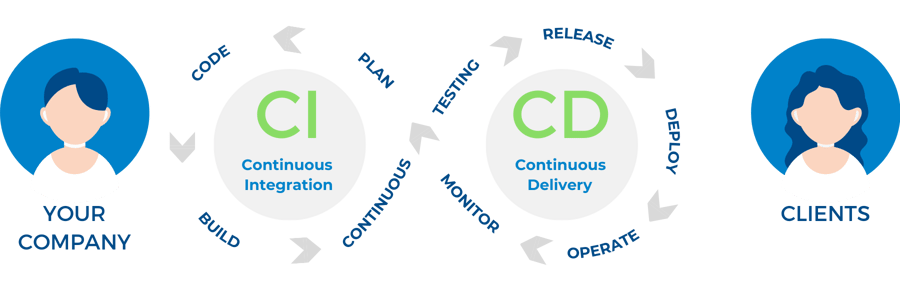AWS DevOps
Essential concepts to understand and apply DevOps in your company
How aligned are your development and operations teams?
Is your company agile in implementing and delivering new features?
Do you use the right tools to facilitate the continuous integration and delivery of your developments?
As is often the case in the technology world, there are always terms that everyone talks about but generally have a rather limited knowledge of. And DevOps is one of them.
What is DevOps?
DevOps is a software development methodology that seeks to closely integrate the areas of development (Dev) and operations (Ops). It is a methodology that combines agile software development practices with operations management, in order to obtain an efficient, flexible, and high-quality software delivery process.
DevOps provides greater speed, collaboration, stability, and flexibility in software development and deployment, which translates into a competitive advantage for organizations in the IT environment.
Looking for fast and reliable delivery of high quality software?
The main advantage of using DevOps is the ability to accelerate software delivery and improve software quality, achieving greater operational efficiency and improved collaboration and communication. In addition to achieving greater scalability and flexibility thanks to the Cloud and Virtualization.
DevOps is based on 3 main pillars:
- Philosophy
- Practices
- Tools
They make a company more competitive when it comes to managing the life cycle of its products and responding nimbly to changes in customers, markets, and competitors.
Can we help you?
Fill out the form and we will help you to streamline your development department.

How to put it into practice?
There is no recipe that applies to all companies, but there are a number of common aspects to take into account for the adoption of DevOps, starting with:
- Company Culture
- Change of mentality in Work Teams
- Adapt to the company's philosophy
.png?width=130&height=130&name=Recursos%20LP%20AWS%20DevOps%20-%20ENG%20(1).png)
It is becoming more and more common to adopt joint work methodologies where the work team is one, that is to say, possible silos are eliminated to the maximum by having all the roles that will participate throughout the life cycle of our product or service present from start to finish.
.png?width=130&height=130&name=Recursos%20LP%20AWS%20DevOps%20-%20ENG%20(2).png)
The work team will be composed of all the roles involved in the lifecycle of the solution. For example:
- Development
- Quality
- Systems and Support
- Operations
- Business
.png?width=130&height=130&name=Recursos%20LP%20AWS%20DevOps%20-%20ENG%20(3).png)
Life cycles increasingly involve a faster pace of change, and the agility of these changes becomes a priority to maintain the competitiveness of our company. Continuous Integration, and Continuous Delivery (CI/CD) prevail so that our product is as complete as possible at all times.
AWS DevOps Solutions
.png)
.png)
.png)
.png)
.png)
.png)
.png)
.png)
.png)
.png)
.png)
.png)
.png)
.png)
.png)
.png)
.png)
.png)
.png)
.png)
.png)
.png)
.png)
.png)
.png)
.png)
.png)
.png)
.png)
.png)
.png)
.png)
.png)
.png)
.png)
.png)
.png)
.png)
.png)
.png)

Continuous Integration and Delivery (CI/CD)
It is a set of practices that automate and accelerate the software development and deployment process.
Talking about CI/CD means talking about code, application updates, compilation, and testing, as well as deployment and automated management of applications for our customers or users.
In this area, we highlight the following services:
- AWS CodePipeline: Oriented to perform application and infrastructure updates in a fast and agile way.
- AWS CodeBuild: For building, testing, and packaging software.
- AWS CodeDeploy: For automating code deployment to any instance type, both cloud and on-premise.

Microservices
Gone are the monolithic environments, replaced by decoupled ecosystems where many parts work in unison to compose a whole. It is a software development architecture that is based on building applications as sets of small, independent services.
AWS' response to these needs is materialized on the basis of services such as:
- AWS Elastic Container Service: the managed Docker platform from AWS
- AWS Lambda: for serverless code execution

Infrastructure as Code (IaC)
We were talking about agility, speed, and efficiency, and these attributes are closely linked to the automation of the infrastructure and services on which the solution we offer our customers is based. In the end, the infrastructure should not be a blocking point when it comes to carrying out lifecycle management, adapting in time and form to the needs of our product.
For this purpose, AWS offers services such as:
- AWS CloudFormation: for deploying ecosystems using code
- AWS Config: to ensure that deployed resources are aligned with pre-agreed security and governance policies
- AWS System Manager: to ensure that the configuration of operating systems and deployed software aligns with previously established policies.

Monitoring and Tracking
We said that DevOps aims at a continuous improvement cycle, one of the pillars of which is the monitoring of performance and deployed resources with the objective of permanently searching for ways to optimize both systems and applications.
To this end, 2 services are important:
- AWS CloudWatch: for monitoring deployed resources
- AWS X-Ray: for application analysis and debugging
Benefits of DevOps



Speed
Speed to innovate for its customers, to better adapt t changes in the markets and to become more efficient in achieving objectives.
Fast delivery
Increase the frequency and pace of releases in order to innovate and improve the product faster (CI/CD).
Reliability
Ensure the quality of application updates and infrastructure changes for faster deliveries reliably, offering the best experience to your users.



Scaling
Operate and manage your infrastructure and development processes at scale. Automation and consistency help you manage complex or changing systems efficiently with less risk.
Improved collaboration
Develop more effective teams with a DevOps cultural model that emphasizes values such as ownership and accountability.
Security
Move quickly while retaining control and maintaining compliance by introducing the right profiles early in the solution design.
Is DevOps for you?
We almost always associate DevOps with leading software development companies or startups, but, although it is true that in these types of companies, it is crucial, it does not mean that DevOps does not make sense in other companies.
Currently, almost all companies usually have a development team to carry out, for example, interfaces with other companies (B2B) or internal developments that support their business processes, so applying DevOps in those tools designed, developed, and operated in-house will provide a great competitive advantage to shorten the time to production, facilitate life cycle management and ensure the quality of them.
6 examples of companies in which it is mandatory to implement this methodology are the following:
1. StartUps companies that have recently been created
It provides them with the ability to deliver products faster, improve quality, adapt to change, operate efficiently, and foster a collaborative culture.
2. E-commerce companies
They need to make rapid changes to their platforms and applications, respond to peaks in demand, and ensure a seamless experience for users.
3. Cloud services companies
Leverage DevOps to automate the management and scalability of your resources, as well as to improve the availability and reliability of your services.
4. Software development companies
Companies whose core business is based on the creation and delivery of software.
5. Financial technology companies (fintech)
They streamline the development and deployment of financial applications, improving security, and data protection, and ensuring compliance with industry regulations and standards.
6. Telecommunications companies
Efficiently manage their networks, implement real-time software updates, and provide innovative and quality services to their customers.
In the world of startups, AWS is widely recognized as a leading solution for the agile and cost-effective development of new companies. Offering exceptional responsiveness and efficient cost control.
When starting a new business, it is crucial to pay attention to certain common aspects, such as cost optimization, elasticity, and agility. These elements are essential to adapt quickly to the ever-changing market and launch a new business model successfully.

Working closely with you, we can leverage the power and flexibility of AWS to build a scalable and secure infrastructure for your startup. AWS allows you to quickly adjust resources as your business grows, avoiding unnecessary expenses and allowing you to adapt to the changing needs of your business.
In addition, as mentioned above, AWS offers a number of services that will accelerate your development process and allow you to get your product or service to market faster.
At Neteris, we understand the unique challenges startups face and how AWS can help you overcome them. Our team of AWS experts will work closely with you to design a customized architecture, implement it efficiently, and provide you with the support and assistance you need at every stage of your business journey.
Why Neteris
 At Neteris we are specialists in assessing business needs and translating them into IT language, choosing the solution or service that best meets the requirements of each company.
At Neteris we are specialists in assessing business needs and translating them into IT language, choosing the solution or service that best meets the requirements of each company.
Therefore, do not hesitate to contact us to study your case and analyze the best way to meet your business requirements.
.png)
.png)
.png)
.png)
.png)
.png)
.png)
.png)
.png)
.png)
.png)
.png)
.png)
.png)
.png)
.png)
.png)
.png)
.png)
.png)
.png)
.png)
.png)
.png)
.png)
.png)
.png)
.png)
.png)
.png)
.png)
.png)
.png)
.png)
.png)
.png)
.png)
.png)
.png)
.png)






 Propuesta de valor
Propuesta de valor
-1.png?width=600&height=111&name=Recursos%20LP%20AWS%20DevOps%20(1)-1.png)
-1.png?width=600&height=111&name=Recursos%20LP%20AWS%20DevOps%20(2)-1.png)

